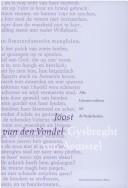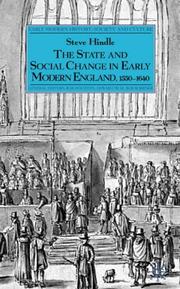| Listing 1 - 10 of 93 | << page >> |
Sort by
|

ISBN: 9053560556 9789053560556 Year: 1994 Publisher: Amsterdam: Amsterdam university press,
Abstract | Keywords | Export | Availability | Bookmark
 Loading...
Loading...Choose an application
- Reference Manager
- EndNote
- RefWorks (Direct export to RefWorks)
Dutch literature --- Théâtre néerlandais --- --XVIIe s., --- XVIIe s., 1601-1700
Book
ISBN: 9780822369950 0822369958 0822369893 0822372282 Year: 2018 Publisher: Dutham: Duke university press,
Abstract | Keywords | Export | Availability | Bookmark
 Loading...
Loading...Choose an application
- Reference Manager
- EndNote
- RefWorks (Direct export to RefWorks)
Femmes --- Aspects religieux --- Église catholique --- XVIIe s. -- 1601-1700 --- Lima
Book
ISBN: 3631496923 9783631496923 Year: 1996 Volume: 13 Publisher: Frankfurt a.M.: Lang,
Abstract | Keywords | Export | Availability | Bookmark
 Loading...
Loading...Choose an application
- Reference Manager
- EndNote
- RefWorks (Direct export to RefWorks)
Autobiography --- Body, Human (Philosophy) --- Littérature --- --Thème --- --Corps --- --Autobiographie, --- XVIIe s., --- History --- Autobiography. --- Human body (Philosophy) --- Body, Human (Philosophy) - History - 16th century --- Thème --- Corps --- Autobiographie, --- XVIIe s., 1601-1700
Book
ISBN: 9789087042790 9087042795 Year: 2012 Publisher: Hilversum: Verloren,
Abstract | Keywords | Export | Availability | Bookmark
 Loading...
Loading...Choose an application
- Reference Manager
- EndNote
- RefWorks (Direct export to RefWorks)
Over het algemeen wordt aangenomen dat broodschrijverij in Nederland pas in de achttiende eeuw opkwam en in de negentiende eeuw een rol van betekenis ging spelen. Voorbeelden van financiële vergoeding voor literair werk in de Gouden Eeuw zijn schaars, en dichters beweerden zelf bij hoog en laag dat ze enkel voor de eer dichtten. Nina Geerdink laat zien dat er wel degelijk voordeel te behalen viel voor zeventiende-eeuwse dichters. Dat doet zij aan de hand van het dichterschap van de katholieke Amsterdammer Jan Vos (1610-1667). Vos was glazenmaker van beroep en als schouwburghoofd betrokken bij het reilen en zeilen van het stedelijke toneel. Zijn gedichten speelden een centrale rol in een patronagerelatie met de Amsterdamse regentenelite die maakte dat het hem niet alleen als dichter voor de wind ging, maar ook als schouwburghoofd, glazenmaker en katholiek.
Vos, Jan --- Vos, Jan, --- Poésie néerlandaise --- --Amsterdam --- --XVIIe s., --- Authorship --- Authorship. --- XVIIe s., 1601-1700 --- Vos, Jan, - approximately 1620-1667 - Authorship --- Vos, Jan, 1610-1667 --- Amsterdam --- Vos, Jan (1610?-1667) --- Poètes --- Conditions sociales --- Vos, Jan, - approximately 1620-1667
Book
ISBN: 9789087044534 9087044534 Year: 2014 Publisher: Hilversum: Verloren,
Abstract | Keywords | Export | Availability | Bookmark
 Loading...
Loading...Choose an application
- Reference Manager
- EndNote
- RefWorks (Direct export to RefWorks)
Recht, onrecht en reputatie waren in de Gouden Eeuw onlosmakelijk met elkaar verbonden. Dit gold voor de legitimatie van het verzet tegen Filips II, maar ook voor de lastercampagnes van verschillende politieke facties in het Rampjaar. Deze bundel biedt een mooie inkijk in de reikwijdte en de rekkelijkheid van het vroegmoderne Nederlandse rechtssysteem
History of the law --- History of the Low Countries --- anno 1600-1699 --- Law --- History. --- Pays-Bas --- --XVIIe s., --- Histoire du droit --- --Pays-Bas --- --Law --- XVIIe s., 1601-1700 --- History
Book
ISBN: 9782868204998 2868204996 9791034404216 Year: 2013 Publisher: Strasbourg: Presses universitaires de Strasbourg,
Abstract | Keywords | Export | Availability | Bookmark
 Loading...
Loading...Choose an application
- Reference Manager
- EndNote
- RefWorks (Direct export to RefWorks)
Jusqu'à la fin du xviie siècle, on a craint, jugé et brûlé sous l'accusation de sorcellerie nombre de femmes (et quelques hommes) qui pensaient mal, mais surtout autrement que ceux qui les jugeaient. Sous la torture, ils finissaient par conforter l'opinion des juges et des savants en leur avouant des choses conformes au stéréotype de la sorcière. L'étude du discours savant et triomphant qui voit dans les faibles femmes le vecteur par lequel le Diable pénètre le monde et menace la société, l'Église et l'État, révèle une confrontation entre une Sorcellerie savante et des mentalités populaires. Le présent livre réexamine cette confrontation en soulignant toute sa complexité, des débuts controversés des chasseurs de sorcières aux opinions opposées sur le sabbat ou la transmutation des hommes en bêtes, en passant par le réexamen médical des effets supposés des sortilèges. Une large place est faite à l'édition commentée des derniers procès de sorcellerie dans une prévôté des Vosges.
Witchcraft --- Witches --- Sorcellerie --- Sorcières --- History --- Histoire --- Sorcières --- --Vosges --- --XVIIe s., --- Sorcière --- --Europe --- --Violence --- --XVIe-XVIIIe s., --- Sociologie --- --Sorcellerie --- --Witchcraft --- XVIIe s., 1601-1700 --- Violence --- XVIe-XVIIIe s., 1501-1800 --- Vosges --- Europe --- histoire --- sorcellerie --- histoire des femmes --- procès
Book
ISBN: 2870888384 2870888090 2870888139 9782870888094 9782870888131 9782870888384 Year: 1997 Publisher: Bruxelles: Hatier,
Abstract | Keywords | Export | Availability | Bookmark
 Loading...
Loading...Choose an application
- Reference Manager
- EndNote
- RefWorks (Direct export to RefWorks)
Histoire --- --XIe-XVIIe s., --- manuel scolaire --- -XVIIIe s.-1918, --- --Ve s. av JC-Xe s., --- --Histoire --- --XVIIIe s.-1918, --- Ve s. av JC-Xe s., -500-1000 --- XVIIIe s.-1918, 1701-1918 --- XIe-XVIIe s., 1001-1700
Book
ISBN: 0198835620 9780198835622 0191873195 019257258X Year: 2019 Publisher: Oxford: Oxford university press,
Abstract | Keywords | Export | Availability | Bookmark
 Loading...
Loading...Choose an application
- Reference Manager
- EndNote
- RefWorks (Direct export to RefWorks)
Homicide has a history. In early modern England, that history saw two especially notable developments: one, the emergence in the sixteenth century of a formal distinction between murder and manslaughter, made meaningful through a lighter punishment than death for the latter, and two, a significant reduction in the rates of homicides individuals perpetrated on each other. 0'Making Murder Public' explores connections between these two changes. It demonstrates the value in distinguishing between murder and manslaughter, or at least in seeing how that distinction came to matter in a period which also witnessed dramatic drops in the occurrence of homicidal violence. Focused on the 'politics of murder', 'Making Murder Public' examines how homicide became more effectively criminalized between 1480 and 1680, with chapters devoted to coroners' inquests,0appeals and private compensation, duels and private vengeance, and print and public punishment. The English had begun moving away from treating homicide as an offence subject to private settlements or vengeance long before other Europeans, at least from the twelfth century. What happened in the early modern period was, in some ways, a continuation of processes long underway, but intensified and refocused by developments from 1480 to 1680. 0'Making Murder Public' argues that homicide became fully 'public' in these years, with killings seen to violate a 'king's peace' that people increasingly conflated with or subordinated to the 'public peace' or 'public justice'
Homicide --- Homicide. --- Mord. --- History --- England. --- Femicide --- Offenses against the person --- Violent deaths --- XVIe-XVIIe s. -- 1501-1700 --- Angleterre
Book
Year: 1963 Publisher: Berkeley [Calif.] : University of California Press,
Abstract | Keywords | Export | Availability | Bookmark
 Loading...
Loading...Choose an application
- Reference Manager
- EndNote
- RefWorks (Direct export to RefWorks)
Diplomatic relations. --- Ukraine. Histoire. XVIIe s. --- Geschichte 1654-1667. --- Moskau. --- Russia --- Russia. --- Ukraine --- Ukraine. --- Foreign relations --- Relations extérieures

ISBN: 1403900469 9781403900463 Year: 2002 Publisher: Basingstoke: Palgrave MacMillan,
Abstract | Keywords | Export | Availability | Bookmark
 Loading...
Loading...Choose an application
- Reference Manager
- EndNote
- RefWorks (Direct export to RefWorks)
This is a study of the social and cultural implications of the growth of governance in England in the century after 1550. It is principally concerned with the role played by the middling sort in social and political regulation, especially through the use of the law. It discusses the evolution of public policy in the context of contemporary understandings and of economic change. It also analyses litigation, arbitration, social welfare, criminal justice, moral regulation and parochial administration as manifestations of the increasing role of the state in early modern England
Politique et gouvernement --- XVIe-XVIIe s., 1501-1700 --- Changement social --- Condition sociale --- Grande-Bretagne --- Angleterre --- History of the United Kingdom and Ireland --- anno 1500-1599 --- anno 1600-1699
| Listing 1 - 10 of 93 | << page >> |
Sort by
|

 Search
Search Feedback
Feedback About UniCat
About UniCat  Help
Help News
News